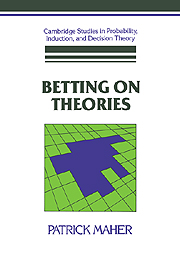Book contents
4 - Subjective probability in science
Published online by Cambridge University Press: 22 September 2009
Summary
CONFIRMATION
The preceding three chapters have been concerned with the Bayesian theory of rational preference. I turn now to a topic that may at first sight appear to be quite remote from those concerns, namely the question of the relation between scientific theories and the evidence for or against them. But as will quickly become apparent, these topics are intimately connected.
All scientific theories go beyond the evidence that is adduced in support of them; hence the truth of the theories does not follow by logic from that evidence. Even if the evidence is correct, it always remains possible that the theory is false. Nor is this a merely idle possibility. Newtonian mechanics was as well supported by evidence as any scientific theory is likely to be, but nevertheless proved to be not the literal truth. This fact naturally leads one to ask why it is that some evidence, which does not guarantee the truth of a theory, is nevertheless regarded as supporting, or confirming, the truth of the theory.
Bayesian philosophers of science hold that scientists have subjective probabilities for scientific theories. Evidence that confirms a theory is then taken to be evidence that increases the scientist's subjective probability for the theory. The question posed in the preceding paragraph is thus construed, from a Bayesian perspective, as a question about why some evidence increases the subjective probability of a theory.
- Type
- Chapter
- Information
- Betting on Theories , pp. 84 - 104Publisher: Cambridge University PressPrint publication year: 1993



